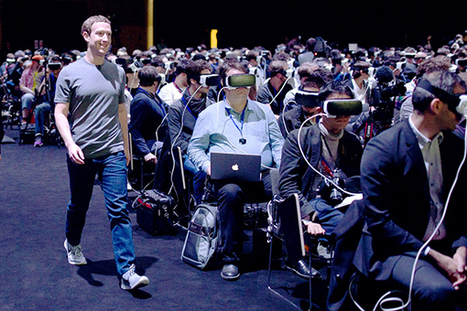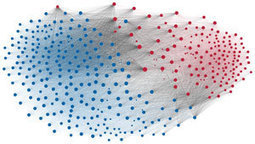 Your new post is loading...
 Your new post is loading...
While the North continues to languish as one of Western Europe’s ecological backwaters a gap has begun to open up with the Republic of Ireland when it comes to policy innovation.
It has sold millions of copies, is perhaps the greatest novel in the science-fiction canon and Star Wars wouldn’t have existed without it. Frank Herbert’s Dune should endure as a politically relevant fantasy from the Age of Aquarius.
Though in his later years he enjoyed huge success, Herbert, the man who dreamed of greening the desert, had mixed feelings about the future. In Dune, he has Kynes, the “First Planetologist of Arrakis” (and hero of the novel’s first draft) muse that “beyond a critical point within a finite space, freedom diminishes as numbers increase. This is as true of humans in the finite space of a planetary ecosystem as it is of gas molecules in a sealed flask. The human question is not how many can possibly survive within the system, but what kind of existence is possible for those who do survive.”
Powerful new quantitative tools are now available to combat partisan bias in the drawing of voting districts.
Is Facebook a structural threat to free society? I make the argument.
“Decentralization” is one of the words that is used in the cryptoeconomics space the most frequently, and is often even viewed as a blockchain’s entire raison d’être, but it is also one of the words…
A systemic crisis in the global Deep System has driven the violent radicalization of a Deep State faction At first glance, this isn’t obvious. Among his first actions upon taking office, Trump vetoed the Trans Pacific Partnership, the controversial free trade agreement which critics rightly said would…
The potential economic damage from global warming should not be influenced by politics.
We live in a time of great uncertainty and confusion. Events keep happening that seem inexplicable and out of control. Donald Trump, Brexit, the War in Syria, the endless migrant crisis, random bomb attacks. And those who are supposed to be in power are paralysed - they have no idea what to do. This film is the epic story of how we got to this strange place. It explains not only why these chaotic events are happening - but also why we, and our politicians, cannot understand them.
"Think the Cold War is over? It may be, but its effects still cast a long shadow over society.
"Systems thinking offered a means of conceptualising and understanding a world that had grown hugely more complex and dangerous. Nuclear weapons demanded radical new ways of thinking about time, scale, power, death, responsibility and, most of all, control – control of technology, people, information and ideas."
It seems we’re entering another of those stupid seasons humans impose on themselves at fairly regular intervals. I am sketching out here…
"We shall require a substantially new manner of thinking if mankind is to survive." ~Albert Einstein For well over 2000 years a competitive "dog-eat-dog" mindset has dominated the world's most powerful human civilizations. The goals of our leaders (as well as most members) have been to conquer, defeat or control whatever (and whomever) we can. Those who thought differently were quickly…
VIDEO: Putting partisanship in perspective.
Thanks to the turbulence of the 2016 U.S. national election season, Americans are looking to pundits and pre-election polling in massive numbers for a glimpse of what the political future holds. There may be a less-known but more reliable way for you to find accurate forecasts of uncertain political outcomes, though: prediction markets, and especially prediction market aggregators like PredictWise. These exchanges can give you a clear, percentage-based idea of what's likely to happen in a given election or primary that benefits from some accuracy-enhancing structural dynamics.
|
Social media platforms are terrific for democracy in many ways, but pretty bad in others. And they remain a work-in-progress
EXECUTIVE SUMMARY The 2017 Positive Peace Report outlines a new approach to societal development through the application of Positive Peace and systems thinking. Positive Peace is defined as the attitudes, institutions and structures that create and sustain peaceful societies. The same factors that create peace also lead to many other positive outcomes that societies aspire to, such as thriving economies, better inclusion, high levels of resilience and societies that are more capable of adapting to change. Therefore, Positive Peace can be described as creating an optimum environment in which human potential can flourish.
How to "organize practical community institutions of participatory democracy and mutual aid that can take root, grow, and gradually supplant the institutions that now rule ordinary people’s lives."
We need to focus on replacing the foundations on which gendered and systems of authoritarian domination have kept rebuilding themselves in different forms.
He may well try to govern as an authoritarian. Whether he succeeds depends less on what he does than on how civil society responds.
That’s why I don’t presume to predict — history is a lesson in complexity not predictability — but what I do feel I’ve learned to understand, thanks to my studies, are the mechanisms of historical change, the how of history’s dynamism rather than the what next. So, in the middle of so many discussions of the causes of this year’s events (economics, backlash, media, the not-so-sleeping dragon bigotry), and of how to respond to them (petitions, debate, fundraising, art, despair) I hope people will find it useful to zoom out with me, to talk about the causes of historical events and change in general.
Cognitive science is the study of HOW we think — the mechanisms we use. This year’s presidential campaign has provided a plethora of evidence for cognitive scientists to study about bias, pre-conceptions, and beliefs. What the science will tell you is that both the hard core Trumpanistas and the mainstream media are exhibiting similar cognitive behavior. They may articulate “facts” and “theories” which are 180 degrees apart — but the mechanisms of bias which both groups demonstrate are pretty much identical.
Bernie Sanders' wife, Jane, discusses her proudest and most difficult campaign moments, the DNC email leak and the future of his revolution.
The Rise of Partisanship in the U.S. House of Representatives
A few weeks ago, we published a blog post about prediction markets and the forecasting power they hold. These markets draw some of their predictive power from a phenomenon called the wisdom of the crowd: the tendency for aggregated estimations or forecasts generated by large numbers of people (typically the median or mean of their responses) to come closer to the truth than any individual response. While the wisdom of the crowd can be startlingly accurate at times, it can fail miserably at others. Today we're going to take a look at why, through the lens of a new study that we conducted.
|
 Your new post is loading...
Your new post is loading...
 Your new post is loading...
Your new post is loading...































